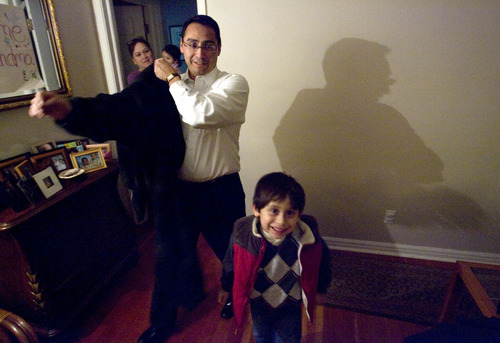This is an archived article that was published on sltrib.com in 2010, and information in the article may be outdated. It is provided only for personal research purposes and may not be reprinted.
It's a dark, chilly evening and Ross Romero — still in slacks and dress shoes — rakes wet, crimson leaves and puts them into neat piles where, just as quickly, his 5-year-old son charges forward and tries to leap over them.
More often than not, the boy doesn't quite hurdle the pile and scatters the leaves back onto the open spaces of grass. Romero barely notices the newly made mess and keeps raking them back into the pile.
Instead, he's focused on a story. It's about a pro-bono case he took while working as a lawyer. The case centered on a prison inmate who was alleging a guard sexually assaulted him. Romero said his client was unsympathetic and had a record littered with violent offenses. He also had ties to white supremacist groups and openly displayed tattoos declaring as much.
As Romero kept moving the leaves into piles, he explained how he made some mistakes as a young attorney in the case — including allowing a witness for his client to get on the stand and brag about his long list of crimes.
His client eventually lost the case, Romero said, because prison sexual assault cases are notoriously hard to prove.
Suddenly, he paused — struck by a revelation.
"You know, I never even thought about how he felt to be represented by a Latino," Romero said with a laugh. "Strange, huh?"
—
A first • Romero, who turned 40 Saturday, is the first Latino to ever hold the position of Senate Minority Leader in Utah. It's a notable moment for a state that has such few Latino leaders in prominent government roles — even if he'll be the most powerful Democratic voice in a chamber where he's outgunned by a 22-7 Republican majority.
Not that he thinks of it that way.
"My experience has been very much from the majority community," he said. "I'm a lawyer, I am a banker and worked within the business community. All of those experiences help me navigate the majority mainstream. But I also recognize I have a unique skill set, which I have and feel duty-bound to extend into the ethnic community and to be a bridge between both."
He said since beginning his Senate service in 2006, he has voted with the majority "85 percent of the time." There are good ideas among the Republicans, he explained, and he has no qualms supporting those bills.
But there also have been times where he's had to take stands. He's been an outspoken supporter of the gay and lesbian community and has sparred with Republicans over bills promoting nuclear power.
The biggest dust-up, however, had nothing to do with partisanship.
It was during the 2008 legislative session when Sen. Chris Buttars, R-West Jordan, spoke against a school redistricting bill. On the floor, playing off Sen. Howard Stephenson's charge that the bill was "an ugly baby," Buttars took it further and said, "This baby is black, I'll tell you. This is a dark, ugly thing."
Romero could scarcely believe what he was hearing and seeing — nobody seemed to notice the racially charged language. As a freshman lawmaker, he wasn't sure what to do.
So, he went to then-Senate President John Valentine and asked him to require Buttars to apologize. He did, and Romero said he appreciated that it was handled quickly instead of allowed to fester.
But he also said the incident was one where he believed a more diverse body might not have allowed the comment to go virtually unnoticed.
"Because of that and other comments, I have gone back and asked that we, as a legislative body, have some cultural sensitivity training," Romero said. "Not as a means to punish, but to recognize that we, as a society, are changing and we're being asked to represent people with more and more diverse backgrounds."
He said that will be increasingly important as the Legislature tackles one of the most emotionally charged issues in recent years: illegal immigration.
—
Beginnings • Romero was born in Pueblo, Colo., and moved to Utah when he was a child. His parents divorced and his father went back to Pueblo while his mother, Anita Bruce, settled on the west side of Salt Lake City and worked as a teacher.
During those early years, Bruce raised him as a single mother — dragging him to meetings at 6 a.m. It was there he was exposed to contract negotiations.
"We'd be working on our written agreements," Bruce said. "It was contract and negotiation strategy sessions. I know he was thinking 'Why am I here?', but he also started picking up on things."
By the time he started at Highland High School, he had melded his hunger for learning with a desire for leadership.
He saw an immediate opportunity to start the Young Democrats on campus.
"There was already an active group of Young Republicans," Bruce said. "But not much in the way of Young Democrats."
Romero said even after he started it, he was outnumbered "by a few hundred, it seemed."
He was a minority by faith, too.
Growing up Catholic, most of his friends and even early girlfriends were LDS. By the time he graduated from high school and enrolled at the University of Utah, his desire to discover more about his ethnicity and background got him hooked into the Center of Ethnic Student Affairs and he received a Chicano scholarship.
And when he graduated from the U., he decided to attend the University of Michigan for law school, where he met his wife. They moved back to Salt Lake City and started a family while they both worked at law firms, with his specialty being in the area of contracts.
—
Politics • Finding Democratic politicians in Utah can be difficult, but Sam Guevara knew quickly Romero was suited for elected office.
Guevara, who was chief of staff under former Salt Lake City Mayor Rocky Anderson, first met Romero at the Utah Hispanic Chamber of Commerce, and he quickly agreed to help Romero run for a seat in the Utah House in 2004. He won by 33 percentage points.
"I think he wanted to do something for the community," Guevara said. "I knew it would be in politics."
Sen. Margaret Dayton, R-Orem, who served with Romero in the House and now in the Senate, said he hasn't changed much since she first met him in 2004.
Back then, she said, Romero "was dependable and very committed to the Democrats' agenda."
Dayton said she expects him to continue to stick to liberal ideals and predicts a "robust" discussion on immigration.
That debate likely will be dominated by Rep. Stephen Sandstrom's polarizing enforcement-only bill. Supporters cite a strong stance in favor of honoring the rule of law, while opponents view it as racist.
"What has been troubling on the immigration issue is that is has gone from public policy discussion to lumping immigration into a Mexican, Hispanic or Latino problem," Romero said. "Some of the rhetoric I've heard used is that if you are Hispanic in the United States, you're suspect. That is a problem when we are generalizing where immigrants come from and we are undermining and demeaning an entire race or nationality because of the color of their skin and country of origin."
In January, when he takes the floor as the first Latino Democratic Minority Leader, he'll have his biggest chance to date to reshape that image.
And, as he has been most of his life, he'll be the underdog.
Ross Romero
Born • Pueblo, Colo.
Age • 40
Party • Democrat
Family • Wife and two children
School • University of Utah; Law School at University of Michigan
Professional • Presently at Zions Bank, vice president, corporate sales resource officer; lawyer at Jones, Waldo Holbrook & McDonough from 1997-2007
Politics • Utah House 2004-2006; State Senate 2006-present





